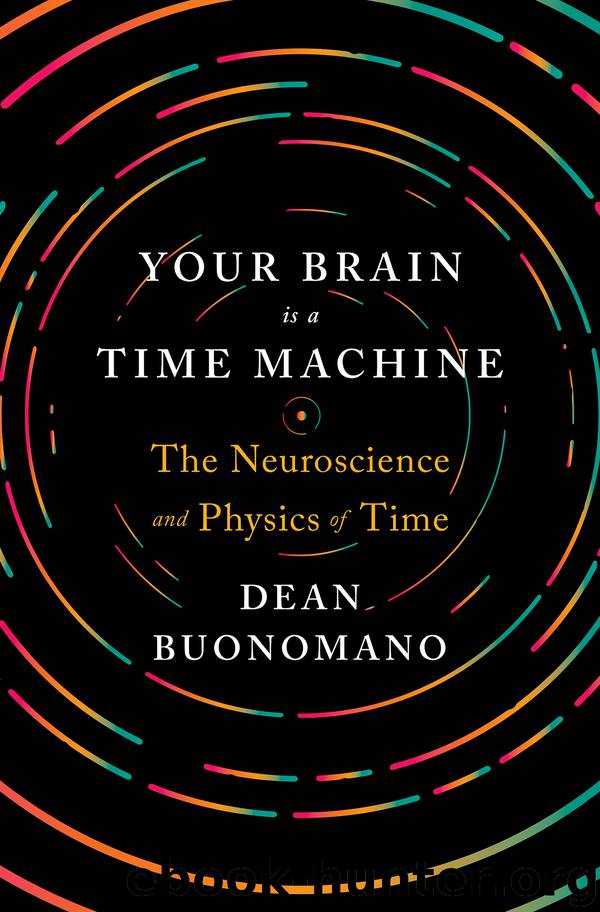Your Brain Is a Time Machine by Dean Buonomano

Author:Dean Buonomano
Language: eng
Format: epub
Publisher: W. W. Norton & Company
Published: 2017-04-05T16:00:00+00:00
9:00: THE SPATIALIZATION OF TIME IN PHYSICS
For us believing physicists, the division into past, present and future has merely the meaning of an albeit obstinate illusion.
—ALBERT EINSTEIN1
One thing that makes basketball so exciting is that the outcome of the game can come down to a race against the clock. The player taking the last shot must release the ball before the clock ticks down to zero and the buzzer sounds. If the ball leaves the hand before the game clock hits zero the shot counts. It would seem that determining which of these two events took place first would be an entirely objective endeavor: the ball either left the player’s hand before the clock ticked down or it didn’t. It turns out, however, that this is not the case.
As a thought experiment let’s suppose that a referee determines that a game-winning shot taken at one end of the court did indeed leave the hand of a player before an atomic clock at the other end of the court counted down to zero. Using some high-tech equipment the referee later confirms that there was a full nanosecond (a billionth of a second) left on the clock when the ball was released. Now let’s also suppose that because this was game seven of the NBA finals, an astronaut was watching the game through a telescope while on an absurdly fast spaceship traveling half the speed of light.2 Upon learning that the shot was valid, the astronaut finds himself slandering the ref’s dear mother, because the astronaut determined that the clock ticked down all the way to zero before the ball was released—and thus the basket should not count. These diverging reports of whether the basket counted and which team was the rightful champ have nothing to do with the delays associated with the amount of time it takes information to travel to the spaceship—we are assuming all parties took those delays into account. The two narratives are simply two equally valid realities, one in which the victorious team deserved to win and another in which the referee gave the game away.
How can this be? Is it possible that two events could occur in one order for one observer, and in a different order for another? If so, what would that say about the nature of time? To answer these questions we must delve into Einstein’s theory of special relativity.
Download
This site does not store any files on its server. We only index and link to content provided by other sites. Please contact the content providers to delete copyright contents if any and email us, we'll remove relevant links or contents immediately.
Periodization Training for Sports by Tudor Bompa(8240)
Why We Sleep: Unlocking the Power of Sleep and Dreams by Matthew Walker(6688)
Paper Towns by Green John(5167)
The Immortal Life of Henrietta Lacks by Rebecca Skloot(4567)
The Sports Rules Book by Human Kinetics(4372)
Dynamic Alignment Through Imagery by Eric Franklin(4200)
ACSM's Complete Guide to Fitness & Health by ACSM(4043)
Kaplan MCAT Organic Chemistry Review: Created for MCAT 2015 (Kaplan Test Prep) by Kaplan(3994)
Livewired by David Eagleman(3757)
Introduction to Kinesiology by Shirl J. Hoffman(3755)
The Death of the Heart by Elizabeth Bowen(3597)
The River of Consciousness by Oliver Sacks(3590)
Alchemy and Alchemists by C. J. S. Thompson(3505)
Bad Pharma by Ben Goldacre(3414)
Descartes' Error by Antonio Damasio(3263)
The Emperor of All Maladies: A Biography of Cancer by Siddhartha Mukherjee(3135)
The Gene: An Intimate History by Siddhartha Mukherjee(3086)
The Fate of Rome: Climate, Disease, and the End of an Empire (The Princeton History of the Ancient World) by Kyle Harper(3049)
Kaplan MCAT Behavioral Sciences Review: Created for MCAT 2015 (Kaplan Test Prep) by Kaplan(2973)
